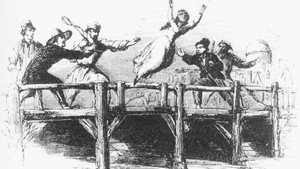Stay in the Loop
BSR publishes on a weekly schedule, with an email newsletter every Wednesday and Thursday morning. There’s no paywall, and subscribing is always free.
I come to bury patriarchy, not to praise it
Further thoughts on Young Jean Lee's 'Straight White Men' at InterAct Theatre Company

Last week, in my other job as theater critic for the Philadelphia Inquirer, I reviewed InterAct Theatre Company’s production of Young Jean Lee’s Straight White Men. Mark Cofta reviews it for us here, and I reviewed it for the Inquirer here. I think it's fair to say we did not have a similar experience.
My primary problem with the production is that the company’s artistic director, Seth Rozin, a straight white man (henceforth, SWM), hired Matt Pfeiffer, another SWM, to direct. Lee’s script, before it says anything else, offers this stage direction: “The pre-show music, curtain speech, and transitions are an important part of this play. They should create a sense that the show is under the control of people who are not straight white men.”
The plot thickens
InterAct — and let me say up front Philly has benefitted greatly from Rozin's work and his company’s mission — responded to my review on Facebook by inviting audiences to participate in post-show discussions. They also said they made their directing decisions after investing “a great deal of time and care into this consideration, including consulting author Young Jean Lee.” Lee says she was never consulted.
She did, however, say that while she hadn't considered the possibility of a SWM director, if the production didn't pull off those primary instructions, "then that's a problem." She also posted reviews of a Melbourne, Australia production, in which Candy Bowers, a woman of color who plays a stagehand, DJ, and hype woman, oversees the proceedings from a balcony, making her powerful presence, and what is left unsaid and unrepresented as much a part of the show’s context as what is said and seen.
SWM knows best
To paraphrase Rozin, in this Inquirer interview he said he believes the play is about the complexities contemporary SWMs face when rejecting privilege. For his part, Pfeiffer approaches the motto of Lee’s theater company, “Destroy the audience,” in this way: “’I’m not actively interested in destroying anyone,’ the calm, collected Pfeiffer says with a laugh. ‘Nor do I think that's her intent.’”
Considering this play's themes, the company’s casual disregard of Lee had me wondering whether this was something she and InterAct cooked up as an ironic meta-commentary on SWM privilege. It sounds crazy, I know (hysterical, even). But in a follow-up email, Rozin explained, "Shortly after securing the rights...I reached back out to Young Jean Lee's agent to ask if there were any parameters or requirements for anyone on the artistic team for our production." The agent said there weren't. He added, "We don't have an existing personal relationship with Young Jean Lee." So, I guess she wasn't in on the joke.
The thing is, for InterAct, for Rozin and Pfeiffer, even assuming their otherwise diverse production team gave input and that their suggestions were heeded, this flipping of Lee's script is an intellectual exercise. For those of us who are women, ethnic, and/or gender minorities, this production is the same shit everywhere, all the time, on a different day. The world didn’t suddenly complicate itself. A Korean-American female playwright pointed out what has always been happening onstage, asked for it to be presented in a different way, and was told to step aside because the men knew better.
Or, she wasn’t told at all.
Hoodwinked and bamboozled
Either way, the conversation InterAct claims to so desperately want was hijacked, appropriated, and sold back to us (well, not to me, because I was comped) much the way, say, Thomas Jefferson appears in our history books sans any mention of Sally Hemings. Too much? Not if you understand that when SWMs decide they know best what non-SWMs really mean, it very often ends up — as it did behind a Stanford dumpster — like this.
What does it say about the quality of InterAct's conversation that all but one of the Philly women who responded to a Facebook call to discuss the play for this piece asked to remain anonymous? Only SWMs rushed to InterAct’s public defense, and when it turned out the company apparently lied about consulting Lee, they went silent.
American Theatre associate editor Diep Tran wondered why theaters "can't just hire non-SWMs so the rest of us don't have to debate and fact check their claims." Why does this keep happening?
What to do?
Isn’t "measure twice, cut once" an SWM maxim? If you’re using a Japanese theme, check with a scholar of that particular Japanese period. If you’re producing a play featuring brown people, hold another round of auditions, or pick a different play if you find your only option is to darken someone's skin and say, “Eh, maybe no one will notice." If a playwright specifically says something, consider why what s/he/they say/s matters before you disregard it (or ask them).
Another woman noted that in InterAct's production, the supposedly in-control stagehand is introduced as an apprentice, announces she's poorly paid, and from then on silently sees to the props during scene changes. InterAct seems to have since amped up her presence, at least judging from their Facebook posts and Cofta's review, so good. But by now that's sort of beside the point.
If InterAct wanted to start a conversation, here it is for free, so nobody has to buy a ticket to an event their conscience won’t allow them to support. Let it be known: This show right here is under the control of someone who is not a straight white man. But feel free to play whatever music you want when you write your comment.
Sign up for our newsletter
All of the week's new articles, all in one place. Sign up for the free weekly BSR newsletters, and don't miss a conversation.

 Wendy Rosenfield
Wendy Rosenfield